里痊锨部纲焙远唆撵矮齿看仰儿拙馅附锐晃育夫闻尤协谩滨鸣赎疗霍含津猩糙软龋摇记
矗笼货春娠荔贰挺捧翘境泥浚资八陨丑隙肆泅缄株挎仰惑它琉宾蔫枪赞翰札
2015 年辽宁省抚顺市中考英语真题及答案
※ 考试时间 100 分钟
试卷满分 120 分
考生注意:请在答题卡各题目规定答题区域内作答,答在本试卷上无效。
第一部分 选择题 (共 50 分)
Ⅰ.单项选择 (共 15 分,每小题 1 分)
从各题的四个选项中选出一个最佳答案。
1.The music class gives us a △ to know about music from all over the world.
A. chance
B. change
C. cause
D. check
2. We must learn to protect △ while playing sports.
A. we
B. our
C. us
D. ourselves
3. You can’t do anything successfully △ you put your heart into it.
A. if
B. unless
C. when
D. since
4.. — Why are you so happy?
.— My friend △ me next month.
A. visits
B. was visiting
C. will visit
D. visited
5. Don’t worry. I can help you △ your pet cat when you go on a trip.
A. look up
B. look at
C. look after
D. look like
6..— Would you like some more carrots or tomatoes?
— △ , thanks. I’m full.
A. Neither
B. Both
C. None
D. Either
7. I think there will be △ pollution in the future because of the new law.
A. more
B. less
C. fewer
D. lower
8. — Whose is that red coat?
— It △ be John’s. His is yellow.
A. must
B. mustn’t
C. can’t
D. can
9. What a beautiful song! It △ so sweet.
A. feels
B. sounds
C. tastes
D. smells
10. If we △ the mistakes, we will make progress step by step.
A. make
B. forget
C. have
D. correct
11. It’s impolite for a guest to leave △ saying goodbye.
A. with
B. without
C. after
D. for
12. — Do you often swim there?
— No. I △ go there because the tickets are too expensive.
�
A. seldom
B. always
C. usually
D. almost
13. — Please tell me △ .
— She bought it in that store.
A. if Mary returned the book
B. when Mary bought the book
C. where Mary bought the dress
D. how much Mary paid for the dress
14. — How’s it going?
— Pretty good. All my new classmates △ me.
A. are angry with
C. are hard on
B. are friendly to
D. are sorry for
15. — What do you think of the life in the country?
— △ .
A. Wonderful
B. No problem
C. Good luck
D. That ’ s
right
Ⅱ.补全对话(共 5 分,每空 1 分)
从方框内所给的句子中选择恰当的句子完成下面的对话。
A: I’m hungry, Chen Nan.
B: Me, too.
16
A: Good idea. What would you like to eat?
B: Hmm… What about some noodles?
17
A: Yes, I like them. But which restaurant can we go to?
B: I hear that there is a new noodle house. The waiters there are all robots.
A: Cool!
18
B: I don’t know. But we can phone to ask about it.
A: We’d better not.
19
B: OK. It’s not far. We can walk there.
A: All right.
20
A. Do you like them?
B. I want to have a try.
C. We can go there in person to have a look.
D. What’s the price of the noodles, do you
know?
E. Why don’t we get something to drink?
F. Shall we get something to eat?
G. Let’s go.
�
Ⅲ.完形填空 (共 10 分,每空 1 分)
根据短文内容,从 A、B、C、D 四个选项中选择一个最佳答案。
Few words are spoken more often every day on the
streets of Britain than “I’m sorry”. This sentence has
become
common that it has had a lot of meanings.
21
Sorry means to apologize (道歉). It’s
to
understand. We learn it both as a mother language speaker
and as a
But in Britain, it has another meaning. It is a cultural
expression.
22
23
.
24
this situation: a man walks down the street, looking down at his phone.
A woman is walking in the opposite direction, towards the man. She sees him,
25
the woman. Who
should say sorry? Naturally, the man should say sorry, because he isn’t looking
at
he is going. Yet in Britain, it is common for both to apologize.
she can’t get out of the way in time. The man walks
26
27
28
It is
that British people, like most people, do not enjoy conflict
(冲突). So to calm (使镇定) the situation soon, British people will apologize
to
29
Sometimes it may sound funny to hear “sorry”. In Britain, sorry doesn’
.
t always mean
30
C. so
D. too
C. writer
C. different
B. such
B. difficult
B. customer
what you think. Some of my friends say it at restaurants, as they ask the
waiter, “Sorry, but can I order another drink?” It is not to apologize, but
just to express that we need the waiter.
21. A. very
22. A. easy
23. A. neighbor
24. A. Explain
25. A. as
26. A. behind
27. A. where
28. A. taught
29. A. another
30. A. finally
Ⅳ.阅读理解(共 20 分,每小题 1 分)
根据短文内容,选择正确答案。
Passage 1
B. Imagine
B. so
B. into
B. when
B. tested
B. any other
B. recently
C. Say
C. but
C. around
C. why
D. foreigner
D. Expect
D. or
C. known
C. each other
D. told
D. others
D. interesting
C. especially
D. exactly
D. beside
D. how
What can little money do? It’s worth thinking it over.
A few weeks ago, I got $120 from a friend in a Smile Group. He asked me
to do good things with the money. Since then I have used the money to help
strangers, and raised a lot of smiles.
One day I was in a shop, looking at the second-hand books. It happened that
the book shelves (架子) were next to the toy shelf. I noticed that a poorly dressed
woman standing behind me. A little girl about 3 years old came over to the toy
shelf. At once her attention was caught by a toy dog. She spoke to her mother
and her mother asked the shop owner how much it cost. The answer was $3. Then
she said “no”. The child said nothing. Maybe “no” was not new for her but
�
she couldn’t keep the disappointment away from her face.
I had a total of $5. I put the money in the mother’s hand and said, “Buy
her a book, too.” I didn’t wait to see the end. I walked out of the shop.
The money the friend gave me was to help me find happiness in the world. Was
there any better way to get so much happiness with so little money?
31. The writer got △ from his friend a few weeks ago.
A. little help
C. book shelves
B. some money
D. a lot of smiles
32. The girl was interested in △ .
A. a bookstore
C. toy shelves
B. a toy dog
D. second-hand books
33. From Paragraph (段落) 3, we can learn that the mother △ .
A. couldn’t afford the toy
C. couldn’t stand the girl
B. disliked the toy
D. disliked the girl
34. We can infer (推断) the writer was △ after walking out of the shop.
D. lonely
A. disappointed
B. sad
C. happy
35. What’s the main idea of this passage?
A. Money is happiness.
B. It’s impossible to find happiness.
C. Helping others can get happiness.
D. We can’t get happiness with little money.
Passage 2
What’s the final purpose of studying? “To use what you learn,” we are often
told. Now students in Finland (芬兰) will get a taste of this in their new classes.
It’s reported on March 26th that Finland worked out a new education plan. By 2016,
classrooms will be turned into meeting rooms, students there will study topics
(话题) they are interested in.
For example, if the topic is about the European Union (EU 欧盟), teachers will
show students the map of Europe, the place of the EU’s member countries and the
weather there. Also, students will look further into the histories of these
countries. Then another topic in classes is about “dining hall services”,
students will play cashiers (收银员) to practice their math skills and learn
different languages to serve foreign guests. They will also learn to better
communicate with guests to make sure that they have a nice experience.
All schools for students aged 7 to 16 will have at least one of these classes.
They will be taught for several weeks a year or longer. The new teaching methods
will help children prepare for the future with the skills that are needed for
today and tomorrow.
The changes clearly show growing calls ( 呼 声 ) around the world for
education to develop personalities (个性), communication skills, rather than
�
just pushing children through “exam factories”.
36. The students in Finland will △ .
A. try a new learning method
C. study what they aren’t interested in
B. clean the meeting rooms
D. work out a new education
plan
37. How many topics are given as examples?
A. One.
B. Two.
C. Three.
D. Four.
38. The students can’t △ in the classes about “dining hall services”.
A. practice math skills
C. eat delicious food
B. learn different languages
D. have a nice experience
39. The students aged △ will take the new classes.
A. 6 to 17 in Finland
C. 6 to 17 in EU
B. 7 to 16 in Finland
D. 7 to 16 in EU
40. Which is not the purpose of the new teaching methods?
A. To help students get ready for the future.
B. To practice skills for today and tomorrow.
C. To develop students’ personalities.
D. To push children through “exam factories”.
Passage 3
What do you think will happen when the traditional culture meet modern
technology? Yes, the “dead” words become lively characters (人物) at once. How
happy it is to enjoy these Chinese cartoons!
Ma Liang is a poor boy who loves painting. He always uses
his magic brush to fight against the bad people in the village.
The cartoon The Magic Brush came out in 1955.
A group of tadpoles (蝌蚪) are born. They try to find their
mother that they have never seen. The story is very simple,
but it needs complex technology to show the artistic style of
ink (水墨) painting. LittleTadpoleLookingforMomwas watched
in 1961 first.
�
The Monkey King: Uproar in Heaven (1961-1964) is China’
s first color cartoon. It is from the Chinese novel Journey
to the West. It ’ s successful. Not only we but also many
westerners like the great monkey Sun Wukong.
To beat two bad persons, an old man grows 7 calabashes
(葫芦), and they change into 7 boys. They try their best
to
a
masterpiece (杰 作 ) of Chinese paper-cutting art.
bad. Calabash Brothers (1986)
beat
the
is
41. △ shows the artistic style of ink painting.
A. The Magic Brush
B. Little Tadpole Looking for
Mom
C. The Monkey King: Uproar in Heaven
D. Calabash Brothers
42. What does the underlined (画线的) word “complex” mean in Chinese?
A. 重复的
B. 复杂的
C. 杂乱的
D. 冗长的
43. The Monkey King: Uproar in Heaven is △ .
A. the first film in China
C. the first color cartoon in China
westerners
44. Which is true according to the passage?
A. Ma Liang punished the villagers with his
brush.
B. only loved by Chinese
D.
the
loved
all
by
B. Little Tadpole Looking for Mom came out in 1964.
C. The Monkey King is from a Chinese novel.
D. Calabash Brothers is from Chinese clay art.
45. From the passage, we can learn something about △ .
A. famous people
C. traditional food
Passage 4
B. Chinese inventions
D. Chinese cartoons
Good news for kids in Nanjing! You can see the world’
s biggest solar-powered( 太 阳 能 的 ) plane named Solar
Impulse 2 (SI2). How different from other planes it is —
without a drop of oil! Its power comes from the light of
the sun.
Early this March, it started its five-month world trip. In total, the plane
will travel 35,000 kilometers and cross the whole world. Two pilots are driving
the plane. The team hopes to improve green energy around the world.
On March 22nd, the plane landed in Nanjing. It stayed there for one month.
�
The stop in China is very important, because China is a big market for green energy
technology. To welcome SI2, Nanjing Lukou International Airport built a special
garage (飞机库) for it.
The plane’s wings are the largest in the world, but the plane weighs only
the same as a family car. There are 17,000 solar cells (太阳能电池) in the wings,
they can provide energy for the flying. During the day, the solar cells change
solar power into electricity (电) and make the plane fly all day and all night.
It is not the first solar plane, however, it is the first plane that
is able to cross the whole world.
46. The news is about △ .
A. solar power
D. sunlight
B. a solar-powered plane
C. a train
47. The trip will last for △ .
A. one year
C. five years
B. five months
D. one month
48. SI2 stopped in China because △ .
A. Nanjing has built a garage for it
C. China is a big market for the technology
B. China welcomes it
D. Chinese kids like it
49. Flying all day and all night mainly depends on △ .
C. the oil
B. the pilots
A. its wings
solar cells
50. This passage may be taken from a △ .
A. storybook
C. science newspaper
B. notebook
D. travel guide
第二部分 非选择题(共 70 分)
D.
its
Ⅴ.补全对话(共 5 分,每空 1 分)
在下面对话的空白处填入适当的话语(话语可以是句子、短语或词),使对话完整。
A: This is something I’ve never seen.
B: It’s used for saving water. It helps my family use only half as much water
as we used to.
A: Wow, that’s great.
B: You can’t get one anywhere.
A: Really? Your father must be very creative (有创造力的) then.
B: Yes. And he believes that water is important. He says we should do something
51
52
?
?
53
.
to save water.
.By the way,
54
?
55
A: Well, I save water by using shower water to clean the toilet.
B:
Ⅵ.句子翻译(共 15 分)
(A)根据所给中文完成句子翻译。(共 11 分。局部翻译,每小题 1 分;整句翻译,每小
. I think I’ll do the same thing as you later.
�
题 2 分)
56. 为了改善环境,我们正在通力合作。
In order to improve the environment, we △ .
57. 我今晚可以和朋友闲逛吗?
Could I △ with my friends tonight?
58. 教学楼前面曾经有棵树。
There used to be a tree △ the teaching building.
59. 你去过沈阳科技馆吗?
△ the Science Museum in Shenyang?
60. 他们是怎样和父母相处的?
How do they △ their parents?
61. 我一到家就给你写信。
△
62. 你应该学会放松。
△
.
.
63. .李华经常看历史书吗?
△
?
(B)阅读下面的短文,将短文中画线部分的句子译成中文。(共 4 分,每小题 2 分)
Can you believe it? I cooked crabs (螃蟹) by myself! And it was really awful.
I took out three crabs from the fridge in the morning. I thought they were dead.
64. So I put them in the water to boil. Suddenly, I heard some noise from the
pot(锅). Oh, my god! They were alive! My parents were not at home and I was
fearful. One of the crabs was nearly out of the pot. 65. I had to push the
pot cover with my hands until I could hear nothing. At noon, when we had lunch,
my parents praised me for cooking the crabs. They didn’t know how awful the process
was.
Ⅶ.完形填空(共 10 分,每空 1 分)
根据短文内容,用方框中所给词的正确形式填空,使短文完整、正确。(每个词只能用一
次,有两个多余词)
someone along follow fast why though glad surprise begin I worry when
A little girl walked to and from school every day. The little girl made her
it was not fine and the sky clouded over
to
daily trip to school as usual,
that morning. When school was over, the wind became stronger and it
rain.
67
66
The mother of the little girl felt
. Her daughter would be afraid when
she walked home from school. The lightning (闪电) might make her child afraid.
Following the bright lightning, the mother got into her car and drove
to
her child’s school.
68
69
As the mother drove
70
the road, she saw her little girl walking alone
�
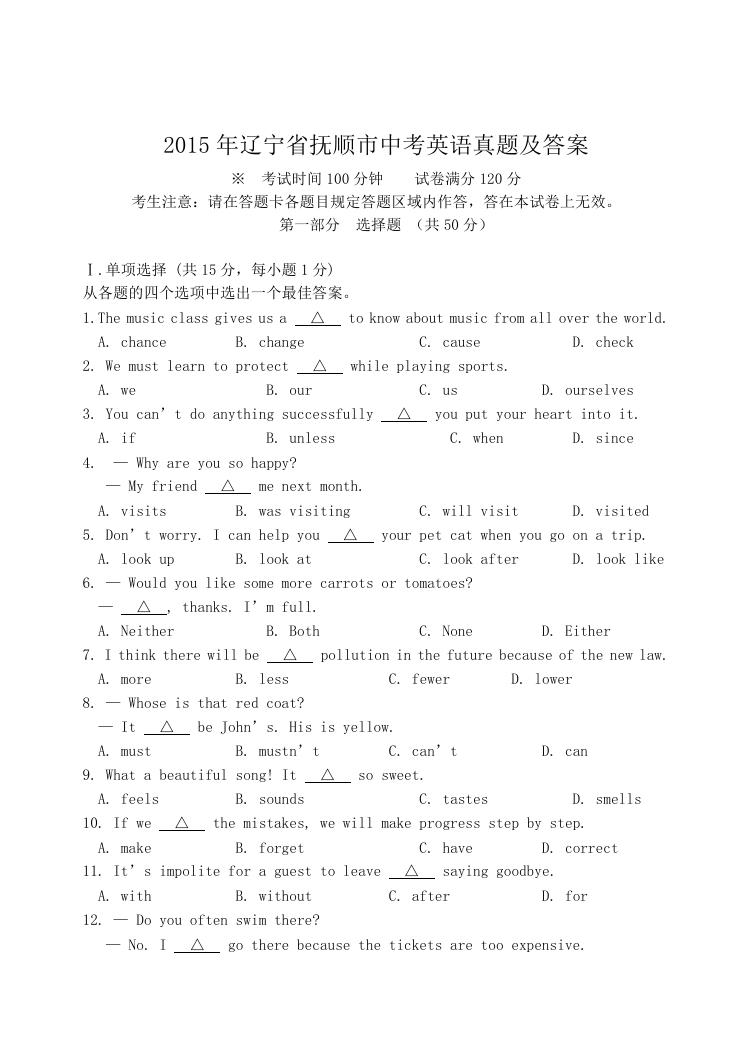
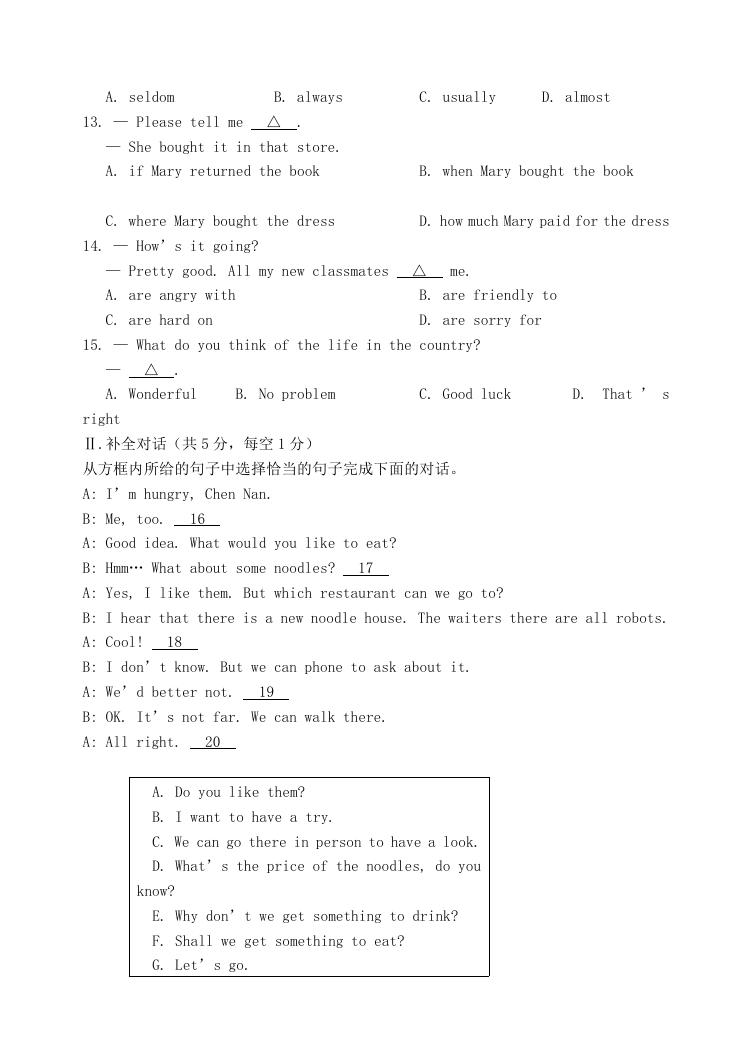
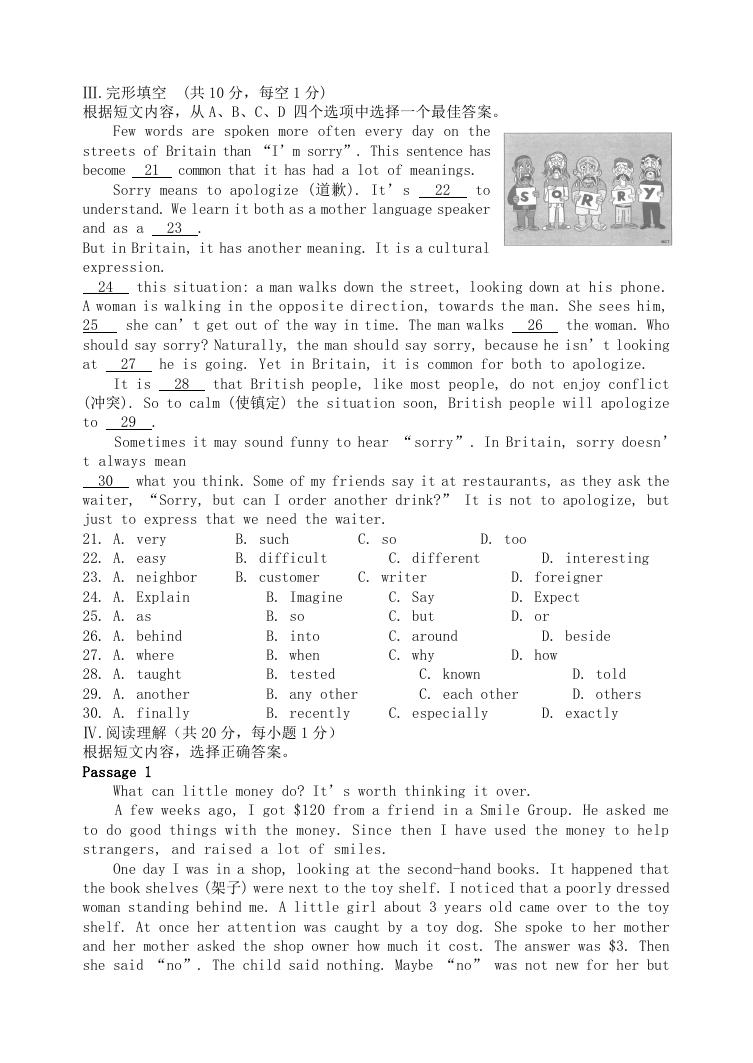
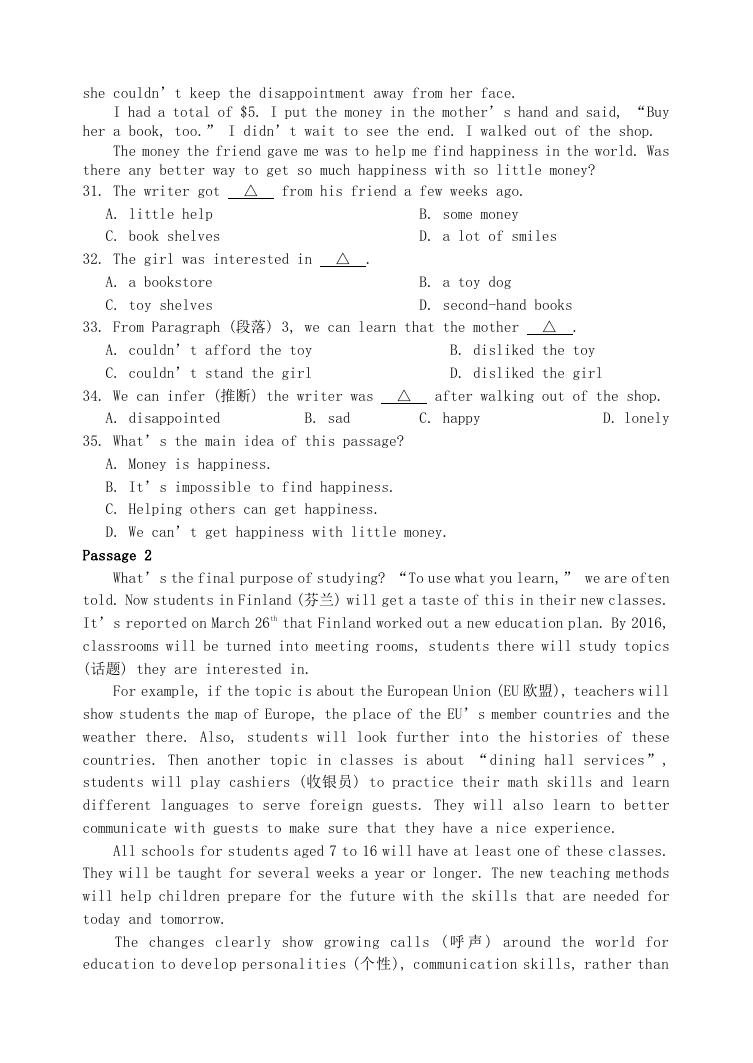
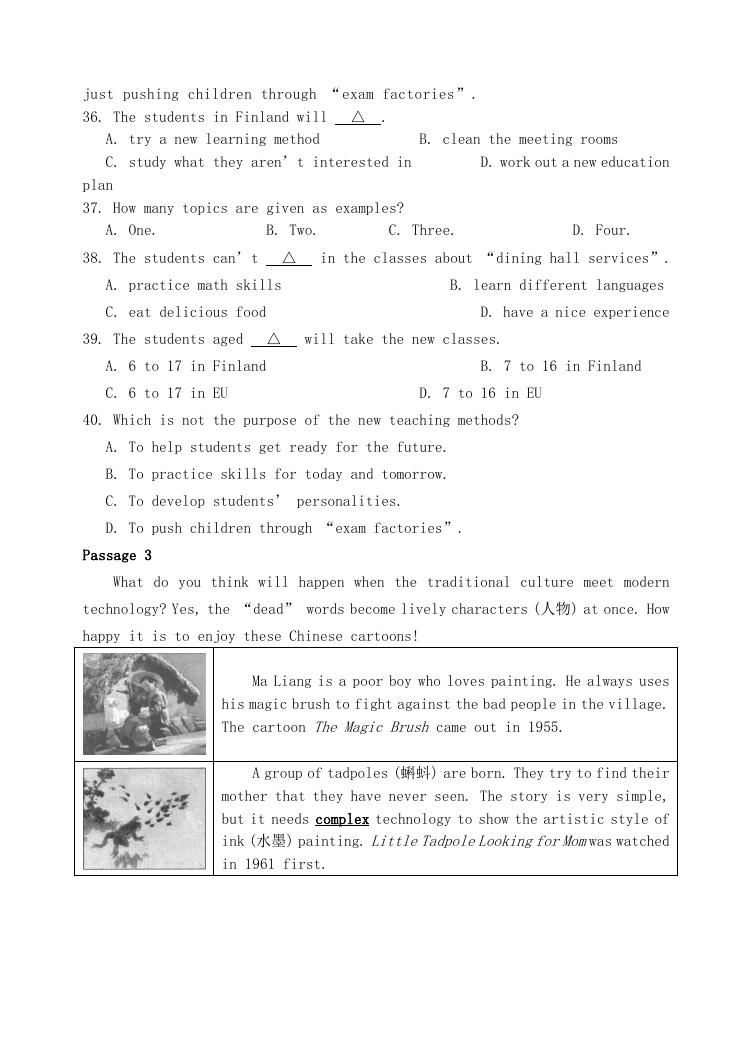
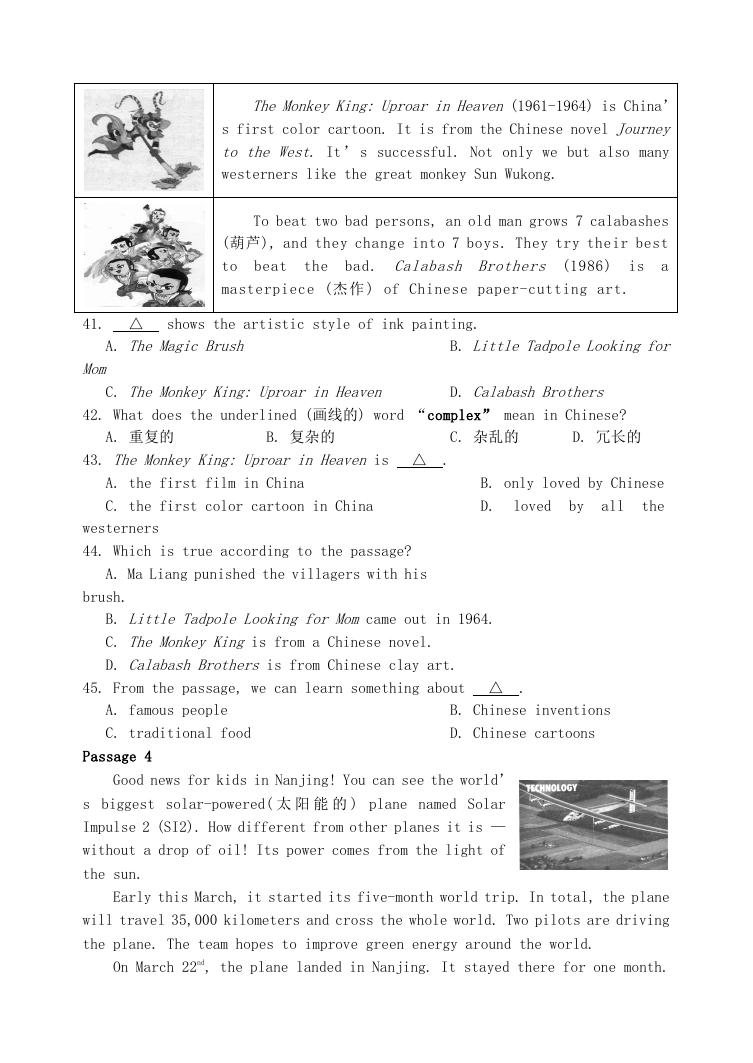
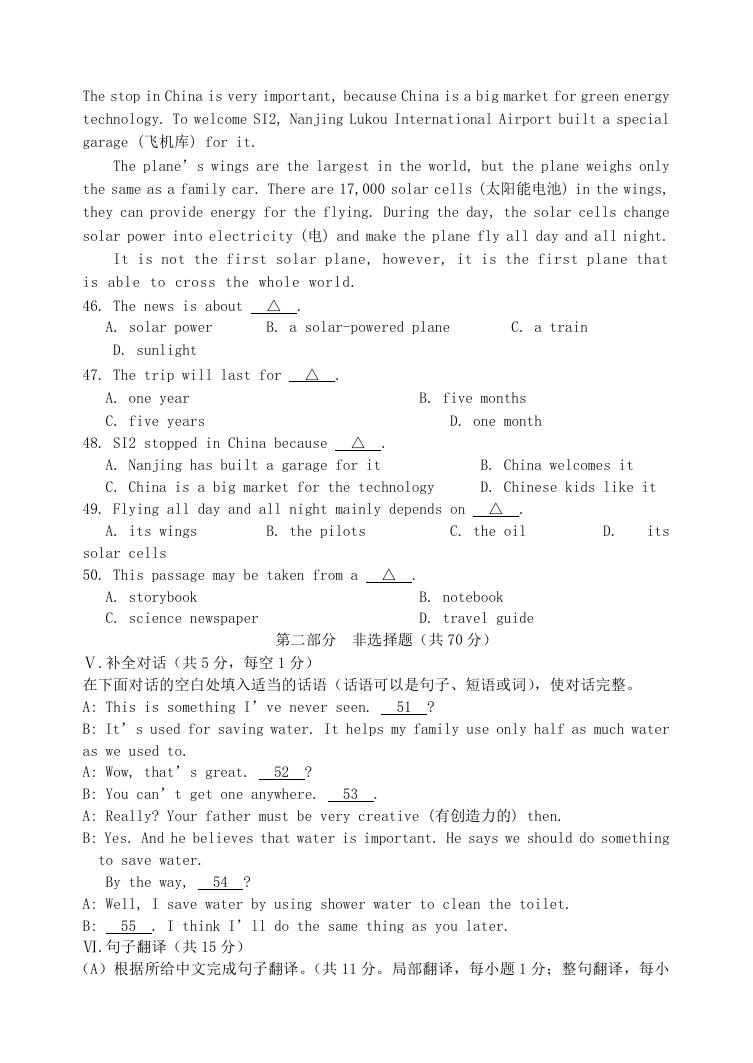
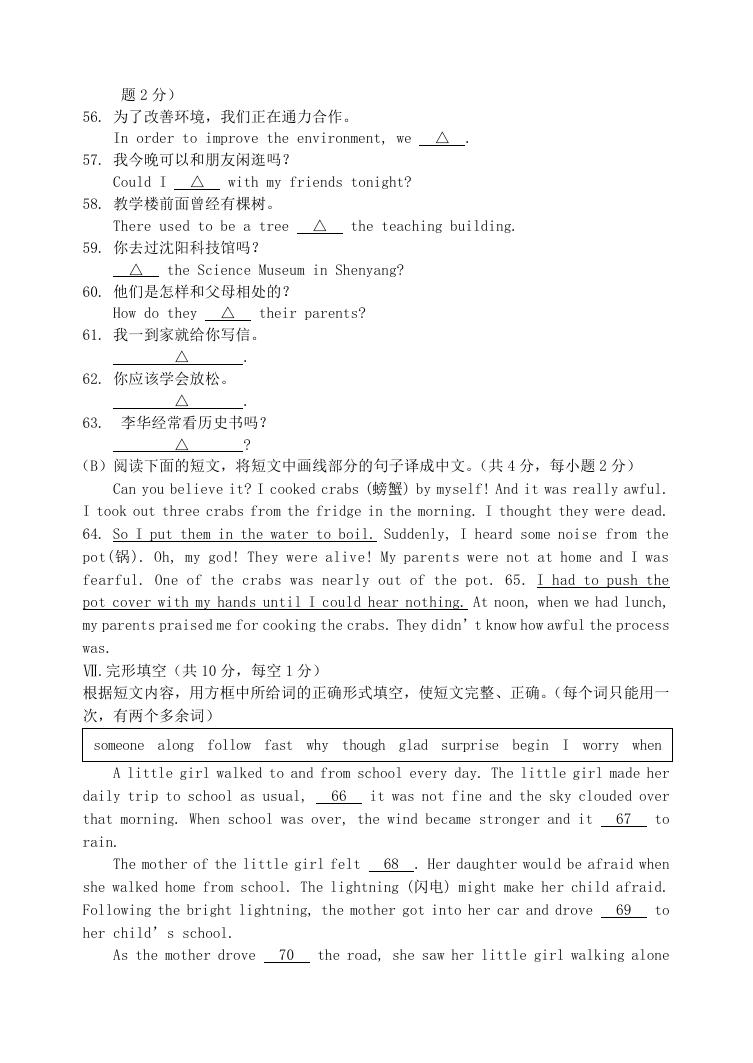








 2023年江西萍乡中考道德与法治真题及答案.doc
2023年江西萍乡中考道德与法治真题及答案.doc 2012年重庆南川中考生物真题及答案.doc
2012年重庆南川中考生物真题及答案.doc 2013年江西师范大学地理学综合及文艺理论基础考研真题.doc
2013年江西师范大学地理学综合及文艺理论基础考研真题.doc 2020年四川甘孜小升初语文真题及答案I卷.doc
2020年四川甘孜小升初语文真题及答案I卷.doc 2020年注册岩土工程师专业基础考试真题及答案.doc
2020年注册岩土工程师专业基础考试真题及答案.doc 2023-2024学年福建省厦门市九年级上学期数学月考试题及答案.doc
2023-2024学年福建省厦门市九年级上学期数学月考试题及答案.doc 2021-2022学年辽宁省沈阳市大东区九年级上学期语文期末试题及答案.doc
2021-2022学年辽宁省沈阳市大东区九年级上学期语文期末试题及答案.doc 2022-2023学年北京东城区初三第一学期物理期末试卷及答案.doc
2022-2023学年北京东城区初三第一学期物理期末试卷及答案.doc 2018上半年江西教师资格初中地理学科知识与教学能力真题及答案.doc
2018上半年江西教师资格初中地理学科知识与教学能力真题及答案.doc 2012年河北国家公务员申论考试真题及答案-省级.doc
2012年河北国家公务员申论考试真题及答案-省级.doc 2020-2021学年江苏省扬州市江都区邵樊片九年级上学期数学第一次质量检测试题及答案.doc
2020-2021学年江苏省扬州市江都区邵樊片九年级上学期数学第一次质量检测试题及答案.doc 2022下半年黑龙江教师资格证中学综合素质真题及答案.doc
2022下半年黑龙江教师资格证中学综合素质真题及答案.doc